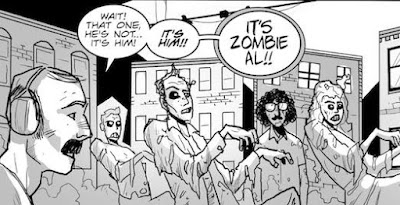Wednesday, February 10, 2010
Recommended reading
I just finished reading Kyle Baker's Nat Turner collection, a recently collected trade paperback retelling the title character's violent slave revolt in the antebellum South. My silent admiration for the book was recently overshadowed by the shocking news that the North Carolina state board of education is considering dropping all reference to the Civil War - all history before 1877, in fact - from their state mandated history curriculum. As I've only recently learned of this proposal, and I haven't read enough to understand if they're instead suggesting something more reasonable, like splitting American history into two sections - one until 1876, the other 1877 to present, for example - I'll try to withhold specific judgment other than to say that there's a reason that the quote "those who ignore history are doomed to repeat it" has stuck around all these years.
I'm from the Pittsburgh area, but for the past few years I've been living in North Carolina, and I've seen more than a few examples of people who don't realize what an atrocity slavery was (not that I even have a great perspective on it) in American history. There are those who fail to realize just what was sacrificed for slaves to gain the limited amounts of freedom they were given in the aftermath of the Civil War, and there are those who don't understand how damaging, demeaning and degrading - both physically and emotionally - the act of slavery inherently is and was. To those people, I would like to recommend a copy of Kyle Baker's masterpiece, all about the life of and, of course, revolt devised by Nat Turner.
Years ago I read The Fires of Jubilee, so I was familiar with Turner and his story, but Baker so deftly illustrates (both literally and figuratively) the period surrounding slavery that Turner showed me sides of himself that I never knew, and perhaps never wanted to know, existed. This story is brutal, violent, and historically accurate in the most terrifying ways.
Nat Turner is such a compelling figure, and one so difficult to understand. It would be irresponsible to condemn him for what he did - gathering a militia and slaughtering white slave owners, their wives and their children - but it's also difficult to look at him as a "hero", for those same acts were as depraved and as gruesome as those acted upon him and those around him for his entire (brief) life.
I can't say that I am as well versed in history as I should be, or as any number of others are, but I can easily understand how socially significant Nat Turner was to the anti-slavery movement. Turner has been, for the most part, written out of the history books, surely because his story is so excessively violent. Just because history may not be as sanitary as we'd like to believe, though, does not mean that we should not learn it and try to learn from it - and Baker shoves Turner and his story back in front of us, no matter how unpleasant it all may be. His choice to present the story with minimal text was a stroke of genius. The solemn image of the layout of a slave ship at the book's end was equally as powerful.
This book sells for around ten dollars. Do yourself a favor and buy it.
Labels:
Comics,
Kyle Baker,
Nat Turner,
Pittsburgh,
reviews
Subscribe to:
Post Comments (Atom)































No comments:
Post a Comment